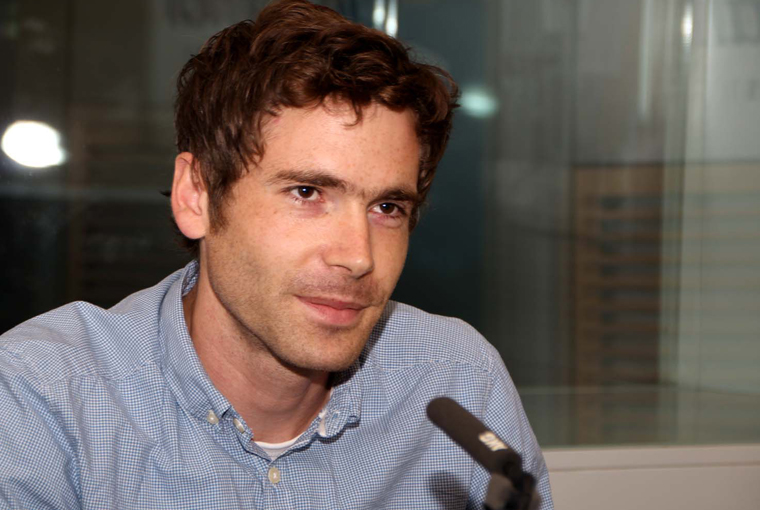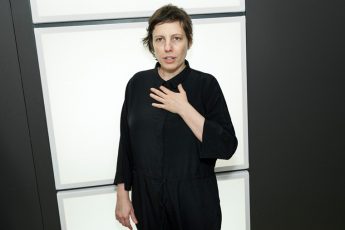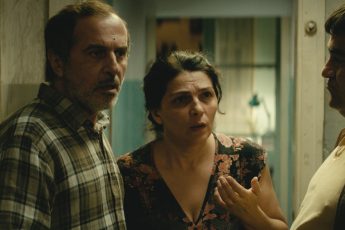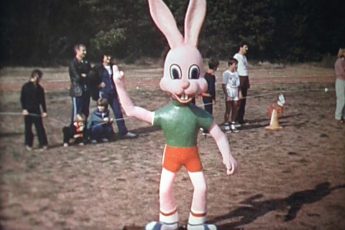
We met Czech filmmaker and journalist Jan Gebert at the Berlinale, where his documentary “When the War Comes” about a right-wing paramilitary group screened in the Panorama section. Gebert shares his views on Central European politics, and reveals what it was like filming a radical political movement.
So how did you originally come to make a film about the Slovenskí Branci militia group?
The topic was already in the air, and I always wanted to reflect on my opinion of what the key issue in Central Europe is, especially for my country (the Czech Republic), which is populism and nationalism. There is a shifting between the archetype of a hierarchy of obedience and authority, and on the other side there is liberalism and democracy, and the pendulum is swinging all the time. It keeps changing and you never know which one will win, but now it’s obvious which part is winning and that these totalitarian tendencies are pretty much everywhere. So I was looking for something in this field, and in early 2015 I realized that there was this paramilitary group just 400 km from my home, in the middle of the EU. It surprised me and I saw it as a sign that something is happening in society. It’s definitely not normal to have a paramilitary group in the EU, especially one led by a guy who was trained by the Cossacks in Russia. And they are all kids, you know, teenagers, so it seemed like A Clockwork Orange story set in modern times that reflected something much deeper. But I think it probably goes much deeper than this and they are just the tip of the iceberg.
Actually, one of the things I found terrifying was the fact that it wasn’t just kids, there were also grown men.
True, true. When I first saw them, most of them were teenagers except for just a couple who were older. They really looked like child guerrillas in Central Europe. But as they started to grow, they became more famous and also more accepted by the public, so established older people started to join and now it’s an organization full of 40 year-olds. And that includes all the ranks of society, not only marginal people. There are also really well-established people with wives and good jobs, and it’s very strange to observe that something that was extremist is now accepted by normal people and nobody really finds it strange or alarming or problematic. Well, not nobody, but society is pretty okay with it.
So is that something you saw change while you were filming?
I think so. It has a lot to do with what happened within politics. The climate changed a lot in the whole West, and after Brexit, after Donald Trump’s victory and after the many crucial moments of 2016 these guys realized that they are not extremists any more and that they are in the political mainstream. History is on their side right now, and that encouraged them to step out of the forest, to be seen everywhere. In Central Europe, it’s well within the political mainstream to be against Muslims, to be against immigration and to even be against the EU project, and to admire Vladimir Putin and authoritarian tendencies, to hate the liberal or free press…
So they took it as an incentive to grow and become something more important than just a militia that trains in the woods. They started to take steps to become accepted by everybody, and, more than that, they took steps to become a political movement. I think I managed to catch the developmental arch of this group, and I always suspected that this would happen – that Peter Švrček would want to go beyond just being a soldier in some paramilitary group – but I didn’t know that the political context would change so much to help him so much, or that it would happen so fast.
Do you think we should be more worried about his party specifically or rather about what it represents?
I can’t actually tell you if he’ll be capable of succeeding. For me, he’s an archetype or a prototype, and I don’t really know if he’ll succeed. I didn’t want to point at these people to focus on this one group. In a strange way, to me, it’s not really a film about them, but more about the society they reflect. I focused on these moments that represent the tendencies in society. At first it looks like an adventurous children’s game with a touch of innocence in it, and then it gets darker and darker, heavier and heavier. It becomes more serious. As the political climate changes, we see them acting in a very similar way – they ban elections, they substitute names with numbers and they take steps to create their own Orwellian society that I think is just a continuation of what they observe in the older generation. They just go one step further and may look a little more exotic, but they copy similar tendencies. So on a small scale, they create something like a small totalitarian regime. I’m focused on these universal moments and I didn’t really want to point my finger at these people and say that they are wrong and they are a source of evil that could contaminate society. I think they are more like the products of society. Society is contaminated already. Of course, if this guy becomes prime minister it would be a disaster, but I don’t think he will make it and that wasn’t what I was interested in. I do care as a citizen, and as someone who lives in Central Europe, but the intention of the film was not to personally identify him as a danger. He is more of a prototype of a future politician who feels encouraged by what is going on around him.
Some of the most powerful scenes are the ones where you can see the structure of the group developing, and it was amazing that you got that footage. I’m thinking in particular of the scene where he denies his intention to go into politics during a TV interview but then admits it to a friend immediately after. Did you get this material simply by building a relationship of trust or by becoming so familiar they forgot about your presence?
This scene came after almost two years of filming, and during the filming it wasn’t as if we just set the cameras up for 20 minutes a day. We were there all the time. We didn’t film everything, but whenever there was training happening we were at least in standby mode. The people got used to the microphone ports, step by step, and they were wearing them most of the time, so we were ready for moments like this. I actually talked to the journalist that interviewed Peter beforehand and I asked her if she could ask about politics, because I felt that this was the path he would take. He was really hiding it, but I sensed that that was what he wanted to do, but he would never tell me or anybody else. So I thought that he would say yes, but when I heard him say no during the interview I thought “oh, fuck, that didn’t work out.” All that effort and nothing came out of it. But still, I wasn’t wearing the headphones so I couldn’t hear what he was actually saying, and I felt that after the interview he would be likely to go to the other guy. So I told the cinematographer to follow him, but he didn’t know what they were talking about. I told him to keep focusing on him in a close up, and I turned away as if I was looking at something else. I didn’t know what we had filmed and I only realized four months later in the editing room, and it was better than I had thought. What I planned was for him to reply to the interviewer, but then it turned out that he contradicts himself when he talks to his friend and reveals his secret plans. It shows him playing games with the media and with so many people. So that was how it happened. It’s an important scene, and it was one of the very few moments when we pushed it a bit. He was so surprised by the question, and that’s why he turned to his friend, because she asked him something that was important to him. If I didn’t get these controversial moments, everything could have gone in the wrong direction.
Did you ever feel him trying to guide your film in any way? How were the negotiations in general?
As I said, I really wanted to follow this transition of them stepping out of the forest when I realized that he’s got this ambition. So I asked him to inform me about what was happening next, and then we prepared for it somehow. They had so many reunions but he only invited me to a couple of them, but I was very lucky I guess you could say. I told him once that I needed to show how they talked about the meetings and how they planned everything for the film. I didn’t really expect that it would be that meeting when he would tell the other guys that he was banning elections in their group. It totally surprised me and he didn’t seem to find it strange to expose it on camera. He was even kind of proud of it, because it helped him look like a strong leader.
Maybe it even encouraged him.
Yeah, maybe, it was a good opportunity for him to say it out loud. There is always some kind of chemistry, you can never tell. He probably would have done it anyway – I don’t think we encouraged him to ban elections – but he might have told his friend the week before or the week after, but then he decided that this was a moment he wanted to have captured. It shows all the different expectations. For him, it’s just proof that he can really handle and manage his own people. He’s the only leader, he doesn’t need to obey anyone and his group is like his playground. That’s why he was kind of okay with the film, because he saw what he is but he doesn’t recognize the pathology in it. Maybe he will when he gets feedback from the film, but the scenes themselves did not make him reflect on his own actions.
You also mentioned at the Q&A during the Berlinale that the group threatened you with lawyers after seeing the film.
Yeah, that happened, but it’s been like that the whole time since the very beginning. At first he would say yes, then no, then yes, then no. It was like a constant game, and there were periods in which I was so stressed out. He stopped talking to us for 6 months. He would sometimes agree to let us come over and film something, but then he would cancel it, and what can you do? It was in the middle of the film. By that point, I had the story outlined and I felt we had enough material, except we still needed to show his ambition to become a politician. We were still missing the scenes that would illustrate that, and he was not willing to invite us to anything, so it was difficult with him. And it’s still the same now, one day he says it’s okay and the next day he says it’s a disaster and he’s going to hire lawyers. But I think he realized that it’s the least manipulated piece it could have become. He felt it was kind of a truthful portrait. He didn’t like certain parts, like the interview with the refugees, and he asked me to erase it but I told him it wasn’t possible. But in the end he agreed anyway. It was a strange situation. I think that he was kind of surprised that I really used an observation method, and that there are no comments or anything like that. I think it was the first time he saw this kind of film about him.
And do you plan to involve the group in future screenings?
I think it’s not a bad idea to include them, cautiously. Maybe we can use it as a kind of bridge between different groups. It would definitely be interesting. I don’t know how else you can change people’s views. If I tried to correct them myself it would have zero effect. They would just stop talking to me and I would just be another idiot. But I think by offering a film that is not manipulative, and by giving them an opportunity to participate in the debate, I can change their view of people like me or of the whole liberal world, so they don’t only feel humiliated, unheard and ridiculed by people.
In the film, it was very interesting whenever you got a glimpse of the discussion they were having about how to present themselves publically. You could see they were carefully watching what they said.
Yeah, they always try to look like nice guys. They try to stay within the law all the time, and not to give the authorities any pretext to take steps against them, so they could thrive and grow and it kind of works out. The main character can be kind of charming and convincing, and this is their strength. They are pretty media conscious, I guess. They know what to say and how to look. They are not the typical stupid, frustrated, unemployed fascists. They’re a much smarter version, and maybe more dangerous because they are smarter. You can’t look at them like a giraffe or a penguin in the zoo, something you can’t relate to because it’s too far away from you. These people are so similar to us that we cannot just ignore them. The problem is among us.
You work as a journalist as well as making films. Was there a particular reason you chose to make a film about this topic instead of writing about it?
Actually, the first thing I did was write an article, but it was one of the stupidest things I ever wrote. I realized that you can’t be neutral when writing an article. It’s different from observation. At the same time, I knew that they would read it and they would judge me and decide whether to let me in based on the article. So it was a terrible mistake. When I worked as a journalist I was always interested in topics like this, but in a way I only enjoyed being a journalist for the first three years and then it just became a way to do something and be paid. I never studied and never intended to study filmmaking, so I was a total outsider and it took me a long time to get into it. In the meantime, I had to work, but I prefer film. I made my first film more or less myself with a camera I bought, and this is my second film.
Do you think there is a difference between the audiences of journalism and film? Which do you feel has more of an impact?
Film, because film can start a debate about something. With the type of journalism I did, which was mainly about social issues, you show it and then it goes away. If you do an investigative piece, it can change things and get people speaking about it, but I find the form too restrictive, whereas film has many more layers. There’s the artistic layer and you can have a more emotional impact. I think for topics like this, the story can be told on different levels at the same time and have a synergetic effect on people.
I also think that since your film was made in a very clean way, it should help it be seen internationally…
I tried to make it as simple as possible and as clear as possible, and to really focus on these children creating their own model of society. In Czech cinema, there is this tradition of making characters ridiculous and making fun of them, putting them in an embarrassing situation where people laugh at them. Bad things are usually exposed through comedy, but I can’t relate to it. This is one of the advantages of me not having any formal education in film and not relating to the stereotypes that a lot of people in the documentary industry in my country share. I feel much freer since I was never processed by this machine.
Plans for future projects?
Very vague. I had an idea to film something in Mexico, where I studied, about journalists that only work on night shifts in Mexico City. They go right around the city with the police, covering car crashes and violence and stuff like that. So I had the idea of doing a film about two journalists starting their career this way. It would be set entirely at night. But now I’m not sure, maybe it’s more important to cover what’s happening here in Central Europe.




“They are not the typical stupid, frustrated, unemployed fascists. They’re a much smarter version, and maybe more dangerous because they are smarter”
I would kindly ask for public apologizing. This statement clearly cross the “red line”.
Sincerely yours,
Filip